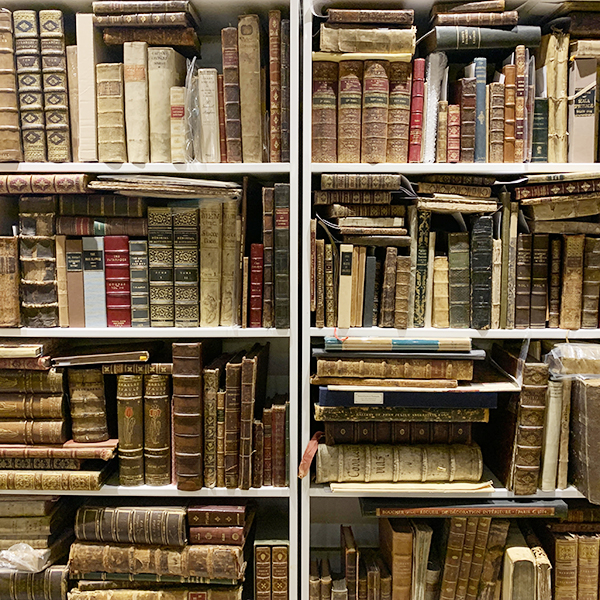Rare Book Appraisal: Bookstore's $45,000 Surprise

Table of Contents
Understanding the Rare Book Market
The market for rare books is a dynamic and fascinating field, influenced by a complex interplay of factors. Understanding these elements is crucial for anyone seeking a rare book valuation.
Factors Determining a Book's Value:
Several key factors contribute to a book's value, significantly impacting its appraisal:
- Rarity: Limited editions, first editions, and books with low print runs command higher prices. The fewer copies in existence, the greater the value.
- Condition: The physical condition of a book dramatically impacts its worth. Factors like binding integrity, presence of original dust jackets, and the extent of wear and tear are meticulously assessed during rare book appraisal. A pristine, well-preserved book is significantly more valuable than a damaged one.
- Author's Significance: Works by renowned authors, particularly those with established literary reputations, fetch higher prices than those by lesser-known writers. The author's influence and legacy directly affect the book's market value.
- Historical Significance: Books associated with important historical events, influential figures, or significant cultural movements often command premium prices due to their historical context and collector appeal. This is a critical element considered in professional rare book appraisal.
- Demand: Market trends and collector interest play a significant role. The current demand for specific titles and authors influences their market value, making understanding market dynamics a key part of the appraisal process.
Identifying Key Characteristics of Rare Books:
Identifying potential rare books requires careful observation of specific features:
- Specific edition markings: Look for details like edition number, publisher's imprint, and date of publication. These markings are crucial in determining rarity and value.
- Publisher information: The publisher's reputation and the quality of their printing can influence a book's value.
- Printing details: Examine the type of paper, the printing methods used, and any unique printing characteristics.
- Provenance: A detailed history of the book’s ownership, particularly if it passed through the hands of notable collectors or figures, can significantly increase its worth. This aspect adds considerable weight during professional rare book valuation.
The Appraisal Process: Steps Involved
Getting your rare books appraised involves a structured process. Follow these steps to ensure a thorough and accurate valuation:
Preparing for Appraisal:
Before contacting an appraiser, take these steps:
- Gather relevant information: Collect any available information about the book, including author, title, publisher, date, and edition details.
- Cleanly package the book: Protect your book during transport using acid-free tissue paper and a sturdy box. Proper packaging is crucial to preserve its condition.
- Research potential value: Use online databases like WorldCat and auction records to research comparable books and get a preliminary idea of potential value.
Selecting a Qualified Appraiser:
Choosing the right appraiser is crucial:
- Experience and Expertise: Seek an appraiser with extensive experience and specific expertise in rare books and manuscripts.
- Professional affiliations and certifications: Look for appraisers affiliated with reputable organizations like the Appraisers Association of America (AAA).
- Reputation and reviews: Check online reviews and testimonials to assess the appraiser's reputation and client satisfaction.
- Transparency in fees and appraisal methods: Ensure the appraiser provides clear information about their fees and the methodology they will use.
The Appraisal Itself:
The appraisal process typically includes:
- Thorough examination: The appraiser will meticulously examine the book's physical condition, noting any imperfections or unique features.
- Research: They will conduct thorough research to determine the book's history, rarity, and market value.
- Documentation and photographic evidence: Detailed documentation and photographs will be created as part of the appraisal process.
- Written appraisal report: A comprehensive written report summarizing the findings and justifying the determined value will be provided. This report is a crucial element of the rare book appraisal process.
The Bookstore's $45,000 Surprise: A Case Study
This real-life story illustrates the unexpected potential of rare book appraisal.
The Discovery:
A small, independent bookstore in a quiet town routinely received donations and overlooked much of its inventory. During a routine inventory check, an employee stumbled upon an old, seemingly ordinary book. Initially, they were unaware of its significance. The initial reaction was surprise and disbelief.
The Appraisal Process in Detail:
The bookstore owner contacted a reputable rare book appraiser. The appraiser examined the book, verifying its authenticity and condition. Detailed research into the book's history and market value followed. The final rare book appraisal revealed its value: $45,000. This unexpected windfall significantly impacted the bookstore's financial stability.
Lessons Learned:
This case study offers valuable insights:
- Regular inventory checks: Regularly reviewing your collection can uncover hidden gems.
- Hidden value: Valuable items can be hidden in seemingly ordinary collections.
- Proceeding after discovery: Knowing how to proceed after discovering a valuable item, whether through selling, insurance, or other means, is crucial.
Beyond Monetary Value: The Significance of Rare Books
Rare books hold immense cultural and historical importance beyond their monetary value.
Historical and Cultural Importance:
- Windows into the past: Rare books provide valuable insights into past societies, cultures, and events.
- Preservation of knowledge: They preserve knowledge and cultural heritage for future generations.
- Role in research and scholarship: Rare books are invaluable resources for researchers and scholars.
Collecting Rare Books as a Passion:
- Building a collection: Many collectors build collections based on personal interests and passions.
- Community: A vibrant community of rare book collectors exists, fostering knowledge sharing and passion.
- Ethical considerations: Ethical considerations related to sourcing and acquiring rare books are essential.
Conclusion: Unlocking the Potential of Your Rare Book Collection
Professional rare book appraisal is crucial for understanding the value of your collection. Factors like rarity, condition, author significance, historical context, and market demand significantly impact a book's worth. The $45,000 surprise from our case study showcases the unexpected financial rewards that can result. Don't underestimate the potential value hidden in your own collection. Get your rare books appraised today! Seek a professional rare book valuation to discover the true worth of your literary treasures and unlock the potential of your collection. Discover the value of your rare books and embark on a fascinating journey into the world of rare book collecting and appraisal.

Featured Posts
-
 Capitals Announce 2025 Playoffs Initiatives Vanda Pharmaceuticals Partnership
May 04, 2025
Capitals Announce 2025 Playoffs Initiatives Vanda Pharmaceuticals Partnership
May 04, 2025 -
 Analyzing Ufc 313 Key Fights And Potential Outcomes
May 04, 2025
Analyzing Ufc 313 Key Fights And Potential Outcomes
May 04, 2025 -
 Legal Ruling Section 230 Doesnt Shield Banned Chemicals On E Bay
May 04, 2025
Legal Ruling Section 230 Doesnt Shield Banned Chemicals On E Bay
May 04, 2025 -
 Honjo Restaurant Review A Modern Japanese Dining Experience In Sheung Wan
May 04, 2025
Honjo Restaurant Review A Modern Japanese Dining Experience In Sheung Wan
May 04, 2025 -
 Health Fitness And Lizzo Her Trainer Responds To Critics
May 04, 2025
Health Fitness And Lizzo Her Trainer Responds To Critics
May 04, 2025
